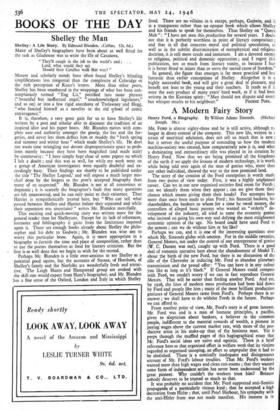BOOKS OF THE DAY
Shelley the Man
Shelley: A Life Story. By Edmund Blunden. 'Collins. 12s. 6d.) MANY of Shelley's biographers have been about as well fitted for the task as Gladstone was to write the life of Casanova.
"They'll cough in the ink to the world's end ; . . Lord, what would they say Should their Catullus walk that way?"
Mature and scholarly minds have often found Shelley's blinding simplifications less congenial than the complexity of Coleridge or the rich perception of Keats's letters. More than other poets, Shelley has been smothered in the wrappings of what has been con- temptuously termed " Eng Lit," petrified into stone phrases (" beautiful but ineffectual angel," "unacknowledged legislators," and so on) or into a few rigid anecdotes of Trelawney and Hogg, "who fancied himself as a novelist in the old school of comic extravagance."
It is, therefore, a very great gain for us to have Shelley's life written by a poet and scholar able to discount the tradition of an inspired idiot and his paper boats. Mr. Blunden moves with com- plete ease and authority amongst the gossip, the lies and the for- geries, and never lets them deflect him or muddy the "fresh spring and summer and winter hoar" which made Shelley's life. He does not waste time wrangling nor devote disproportionate space to prob- lems merely because they have been magnified (and made stale) by controversy : "I have simply kept clear of some papers on which I felt a doubt ; and this was as well, for while my work went on a group of American investigators were equally doubtful and ex- ceedingly busy. Their findings are shortly to be published under the title 'The Shelley Legend,' and will expose a much larger mis- ' chief done by the forgers to the poet's accepted biography than many of us suspected." Mr. Blunden is not at all censorious or dogmatic ; it is scarcely the biographer's fault that many questions are left unanswered, and he can only point to their existence. Thus Harriet is sympathetically treated here, but "Who can tell what passed between Shelley and Harriet before they separated and while their separation was uncertain? " writes Mr. Blunden mercifully.
This exciting and quick-moving story was written more for the general reader than for Shelleyans. Except for its lack of references, footnotes and bibliography it gains from the limitations imposed upon it. There are enough books already about Shelley the philo- sopher and his debt to Godwin ; Mr. Blunden was wise not to worry this particular bone. Again, it is more appropriate in a biography to furnish the time and place of composition, rather than to use the poems themselves as food for literary criticism. But the first is so well done that we begin to wish for the second. Perhaps Mr. Blunden is a little over-anxious to see Shelley as a potential good squire, but the accounts of Sussex, of Horsham, of Shelley's family and the Norfolks are wonderfully fresh and attrac- tive. The Leigh Hunts and Hampstead group are evoked with the skill one would expect from Hunt's biographer, and Mr. Blunden has a fine sense of the Oxford, London and Italy in which Shelley
lived. There are no villains in it except, perhaps, Godwin, and it is a transparent rather than an opaque book which allows Shelley and his friends to speak for themselves. Thus Shelley on "Queen Mab ": "I have not seen this production for several years. I doubt not that it is perfectly worthless in point of literary composition ; and that in all that concerns moral and political speculation, as well as in the subtler discrimination of metaphysical and religious doctrine, it is still more crude and immature. I am a devoted enemy to religious, political and domestic oppression ; and I regret this publication, not so much from literary vanity, as because I fear it is better fitted to injure than to serve the sacred cause of freedom."
In general, the figure that emerges is far more practical and less fantastic than earlier conceptions of Shelley. Altogether it is a highly successful book, and will give a great deal of pleasure, and benefit not least to the young and their teachers. It reads as if it were the easy product of many years' hard work, as if it had been written in the Keatsian spirit: "Man should not dispute and assert but whisper results to his neighbour." PHOEBE POOL.


























 Previous page
Previous page